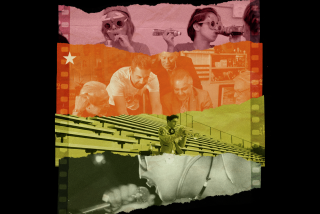Los Angeles International Latino Film Festival to begin Sept. 12
IN THE film “Paraíso Travel,” a young immigrant named Marlon finds himself lost and broke shortly after arriving in New York and being separated from his girlfriend, the cunning and sexy Reina, played by Angélica Blandón. He meets an older man, a fixer for new arrivals, who helps him find shelter and asks the naive illegal what else he might need.
“How do I get rid of this fear?” asks Marlon, somewhat overplayed by Aldemar Correa.
Of course, the old man can’t help him with the dread that haunts strangers in a strange land, except to say that in time it goes away. That small, intimate moment in this occasionally overwrought drama offers a glimpse into the emotional and mental toll of the immigrant experience, which is often seen through ideological eyes.
“Paraíso,” the year’s biggest box office hit in Colombia, will have its West Coast premiere during the 12th annual Los Angeles Latino International Film Festival, which begins Friday. It’s one of 132 films that will screen at the festival, co-founded by Edward James Olmos, Marlene Dermer and the late George Hernández to spotlight Latino films. Ironically, the festival has suffered from the very success it has sought as top Latino filmmakers now find themselves courted by other festivals. Still, many consider the festival (which counts The Times as a sponsor) as a special opportunity to show their work in the U.S.
Directed by L.A.-based Colombian filmmaker Simon Brand, “Paraíso” typifies trends being spotlighted this year -- movies about immigration and movies made in Colombia. That country, not long ago ravaged by kidnappings and civil war, is experiencing a filmmaking boom fueled by government subsidies and an emerging social stability.
The young filmmaker, who holds U.S. and Colombian citizenship, says he gets “extremely upset” when he travels and finds his country’s dangerous reputation still precedes him. He recalls that many in the cast of his freshman feature, 2006’s “Unknown,” declined to attend premieres in Cartagena and Bogota for fear of being kidnapped, or other violence. Only James Caviezel and Jeremy Sisto made the trip, he says.
Seven features from Colombia are being screened at the festival, tying Mexico for the most entries. The Colombian films also include “La Milagrosa,” about an upper-class Colombian who undergoes a transformation after being kidnapped by guerrillas, and “El Angel del Acordeón,” about a poor 11-year-old boy who uses music to try to win the heart of a girl.
Music dominates the documentary category. Tango is the star of Argentina’s “Café de los Maestros,” a sort of Buena Vista for Buenos Aires old-timers co-produced and co-written by Oscar-winner Gustavo Santaolalla, who is being honored with the Gabi Lifetime Achievement Award.
There are separate films about three Cuban stars -- singer Celia Cruz, pianist Bebo Valdés and bassist Israel “Cachao” Lopez. Plus, documentaries about the evolution of rock in Mexico, the explosion of Chicano rock in East L.A., and the remarkable Venezuelan classical music program for disadvantaged youth that produced the next conductor of the L.A. Philharmonic, Gustavo Dudamel.
But beware viewers drawn to the infectious music of Mexican accordion ace Celso Piña featured in “Cumbia Callera” (Street Cumbia): The music is terrific but the hard-core sex scenes are shockingly vérité. The drama about a man who secretly follows and videotapes a woman he spots on the street unfolds with almost no dialogue, managing to convey the gritty ambience of Monterrey and its cumbia culture.
The most striking growth this year is seen in the number of entries from the United States, the most ever, including six feature films, 27 shorts and 15 documentaries.
Among them is “Calavera Highway” by Oscar-nominated director-writer Renee Tajima-Peña (“Who Killed Vincent Chin?”) who tells the true tale of two brothers who take their mother’s ashes back to South Texas and discover family secrets along the way.
Perhaps no film illustrates the aspirations of U.S.-born Latino filmmakers more than “Alondra Smiles,” the story of a wholesome teenager whose dreams of a quinceañera are threatened by her scheming cousin. The teen rivals are played by Montebello-born Natalie Gomez in the title role and Paloma M. Rodriguez, an Angeleno of Cuban-Mexican descent, as Tatiana, the wicked prima.
The sweet family movie marks the directorial debut of Conchita Nora Villa, who was born in East L.A. and raised in Monterey Park.
The UCLA graduate and former production assistant financed the film with funds from her parents, who tapped their savings, and her brother, Juan Francisco Villa, who used proceeds from the sale of his Pico Rivera house to buy film equipment. Sisters Janet and Yvette signed up as co-producers and the cast was stacked with family and friends who worked for the love of it.
The Villas worked wonders with a budget of $80,000. Today, they operate their Villa Media Productions out of their parents’ Hacienda Heights home. You could say the making of this movie is an immigration story too. The part in which the children of immigrants start taking their place in America.
“Wow, this is really special for me,” says the director, who worked as a volunteer chauffeuring celebrities to the first Latino film fest. “It’s like a complete circle coming back and showing my film in my own backyard.”
The 12th annual Los Angeles Latino International Film Festival, Friday to Sept. 19 at the Egyptian Theatre, Grauman’s Chinese Theatre and Chinese 6 Mann Cinemas on Hollywood Boulevard. For information, call (323) 469-9066 or go to www.latinofilm.org.
More to Read
The biggest entertainment stories
Get our big stories about Hollywood, film, television, music, arts, culture and more right in your inbox as soon as they publish.
You may occasionally receive promotional content from the Los Angeles Times.










